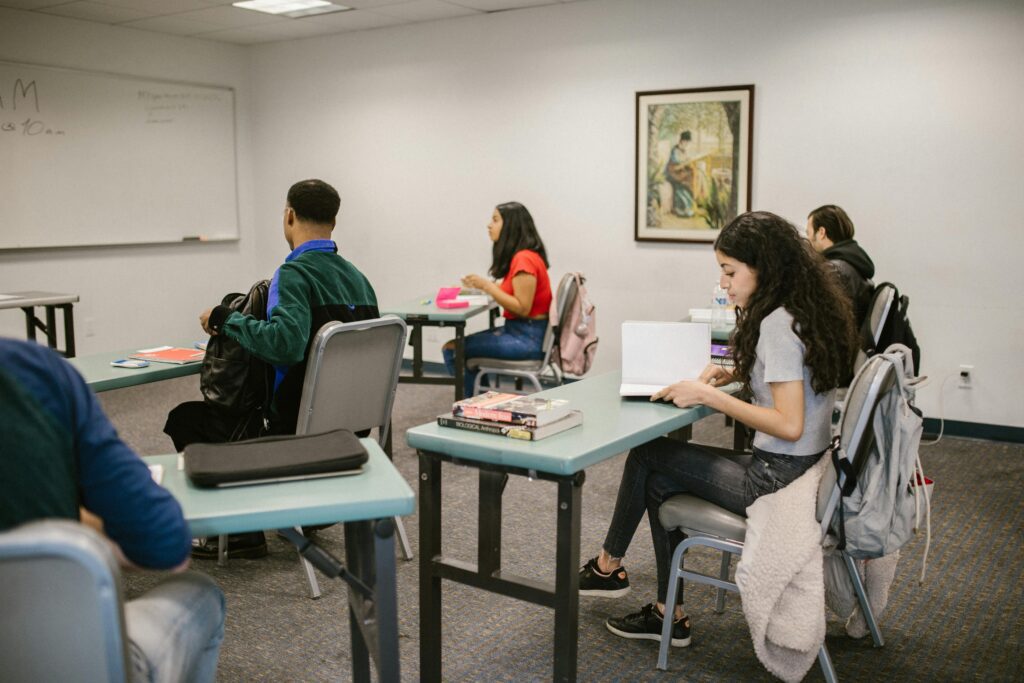5 Must-Have Skills When Studying Abroad 🌎💡
Studying abroad is an exciting opportunity to gain new experiences, explore different cultures, and build crucial life skills. However, it also comes with challenges that can make the study experience more complicated than expected.
From adjusting to a new academic environment to navigating social and cultural differences, students often find themselves facing unexpected obstacles. Being well-prepared with the right skills can make all the difference in ensuring a smooth and successful transition to international education.
As an international academic coach I help students prepare for studying abroad and found that mastering a few essential skills can significantly enhance the experience.
Crucial competencies such as time and organization management, maintaining mental health and a positive mindset, and advanced test preparation strategies empower students to handle the pressures of studying abroad effectively and thrive in their new environment.
About Me
I’m Alexandra, a former high school teacher in Austria, Switzerland, and the Netherlands, now an academic coach since 2020, supporting students worldwide. With a Master’s degree in Psychology, I specialize in understanding the teenage mind and helping students achieve academic success. My focus is on working with students aged 15 and older, including young professionals in their 20s, to enhance their productivity and mindset. Over the years, I’ve supported parents, high school students, and young adults, particularly during critical transitions to higher education.

My expertise lies in addressing both academic and mental health challenges to alleviate the burden of academic pressure.
In this article, we will explore five must-have skills that every student should develop before embarking on their study abroad journey.
1. Communication and Social Skills
Effective communication and social skills are crucial for a successful study abroad experience. Whether it’s participating in class discussions, forming friendships, or handling day-to-day tasks, being able to express yourself clearly and confidently is essential. According to a study by the Institute of International Education (IIE), 85% of students reported that studying abroad improved their communication skills, particularly in adapting to new cultural contexts. This skill goes beyond just speaking and listening; it involves understanding cultural nuances, body language, and social etiquette to navigate unfamiliar environments.
For example, imagine you’re in a group project with international classmates. You might find that communication styles differ—some cultures value directness, while others rely on subtlety and context. Without strong communication skills, misunderstandings can arise, leading to frustration and decreased teamwork efficiency. Similarly, writing skills are equally important. Whether it’s drafting essays, emailing professors, or even filling out important paperwork, the ability to convey your thoughts effectively in written form can prevent miscommunications and ensure clarity in academic and professional settings.
Parents can support their teens by encouraging them to engage in language learning before departure or by practicing real-life scenarios, such as ordering food in another language or participating in online discussions with international peers. Ultimately, developing communication and social skills not only enhances academic success but also helps students build meaningful relationships and integrate smoothly into a new culture.
2. Time and Organization Management
Effective time and organization management is one of the most important skills students need when studying abroad. Balancing academic responsibilities with social activities, part-time work, and self-care can be overwhelming without proper planning. According to the American Psychological Association (APA), poor time management is a leading cause of academic stress among students, with 87% reporting that they struggle with deadlines and workload management. Developing strong organizational habits early on helps students avoid last-minute cramming, missed assignments, and burnout.
One practical example of this is a student juggling classes, extracurricular activities, and a part-time job in a foreign country. Without a clear plan, they may find themselves falling behind on coursework, struggling to complete assignments on time, or feeling too exhausted to enjoy their new environment. Implementing strategies such as using digital planners, setting realistic goals, and breaking larger tasks into smaller steps can help students stay on track.

Psychological theories, such as Parkinson’s Law, which states that “work expands to fill the time available for its completion,” highlight the importance of setting strict deadlines to avoid procrastination. Tools like the Pomodoro technique—where students work in focused intervals with short breaks—can improve productivity and concentration.
Parents can support their teens by helping them establish good time management habits before departure, such as creating a daily schedule that includes study time, leisure, and rest. Encouraging the use of organization apps or providing a planner can also foster independence and self-discipline.
Ultimately, mastering time and organization management allows students to make the most of their study abroad experience—ensuring they excel academically while still having time to explore and enjoy their new environment.
3. High Motivation and Positive Mindset
Maintaining a high level of motivation and a positive mindset is crucial for students studying abroad. The experience brings exciting opportunities but also challenges that require resilience, adaptability, and confidence. According to psychologist Carol Dweck’s growth mindset theory, students who believe they can develop their abilities through effort and learning are more likely to overcome obstacles and succeed in unfamiliar environments. This mindset is particularly important when adjusting to new cultures, academic expectations, and daily life in a foreign country.
One key aspect of thriving abroad is adaptability. Students must be open to new experiences and willing to step out of their comfort zones. This could mean trying unfamiliar foods, navigating a new transportation system, or engaging in conversations with locals despite language barriers. For instance, a student who once relied on structured class schedules back home may need to adjust to a more flexible approach to learning in their host country, where class structures and grading systems may differ. Embracing these differences with an open mind fosters personal growth and cultural appreciation.

Master Self-Responsibility
Decision-making skills are also essential for independence abroad. Students will often face situations where quick, informed choices are necessary—whether it’s deciding how to spend their weekend, handling unexpected changes in their study plans, or making safe choices in unfamiliar environments. For example, if a student realizes they don’t have a valid ID for a night out, choosing a safer alternative such as using ride-share services instead of walking home alone can prevent potential risks.
Confidence and self-trust play a significant role in successful adaptation. A student with a strong belief in their abilities is more likely to seek out opportunities for growth, such as joining local student groups or exploring new cities. In contrast, those who lack self-assurance might struggle with homesickness and isolation. Building confidence can be as simple as setting small goals, such as mastering a few phrases in the local language or making a new friend in class.
Parents can support their teens by encouraging a positive mindset before departure. Providing reassurance, fostering independence in decision-making, and discussing potential challenges can help students feel more prepared. Encouraging students to stay proactive, remain flexible, and embrace new experiences will allow them to make the most of their study abroad journey while maintaining their motivation and enthusiasm.
4. Academic Skills
Studying abroad presents a unique set of academic challenges. A new education system may differ significantly from what you’re used to, and the level of support available might not be the same as back home. Professors may have different teaching styles, and they might not always be familiar with diverse learning preferences or have the capacity to provide individualized attention. This makes it crucial to understand your own study habits and develop a structured approach to time and organization management.
Effective academic skills include knowing how to balance study time with social activities and self-care. Overloading yourself with coursework while trying to explore a new culture can lead to burnout. Studies have shown that students who maintain a structured daily routine are more likely to adapt successfully to academic challenges abroad. According to a study published in The Journal of International Students, time management and self-regulation are among the top predictors of academic success for students in foreign environments. Setting aside dedicated study sessions, creating achievable goals, and ensuring time for relaxation and socialization can help maintain overall well-being.

Study Problem-Solving
Another critical aspect is problem-solving. Whether it’s adapting to different teaching methods, handling a heavy workload, or managing cultural differences within group projects, students need to develop the ability to think on their feet and resolve issues efficiently. For example, you might find yourself in a situation where your classmates don’t speak your native language, requiring you to find alternative ways to collaborate—such as using translation tools or seeking out bilingual classmates for assistance. Similarly, if your living situation presents challenges, such as a noisy roommate or unfamiliar living conditions, addressing these issues proactively and diplomatically will enhance both your academic focus and personal growth.
Adapting to a new academic environment also means being proactive in seeking help. Many universities have academic resources such as writing centers, tutoring programs, and study groups, but you need to take the initiative to utilize them. Developing independent learning strategies, such as using online resources, practicing self-discipline, and staying organized with planners or digital tools, can go a long way in ensuring academic success.
Ultimately, fostering strong academic skills not only helps you succeed in your studies abroad but also equips you with life-long problem-solving abilities. Whether it’s adjusting to new academic expectations, managing your schedule efficiently, or navigating cultural differences in an academic setting, being prepared will help you make the most of your international education experience.

5. Advanced Test Preparation Skills
Studying abroad means competing with students from diverse academic backgrounds, and while you might feel confident in your abilities, others may be just as prepared—or even ahead of the curve. To truly excel, you need internationally proven test-taking strategies that go beyond what is typically taught in schools. Most institutions focus on subject content rather than how to study effectively, which leaves many students struggling to develop the right strategies on their own. Understanding advanced test preparation techniques gives you a significant advantage and ensures you can retain and apply information more efficiently.
Strategic Study Planning:
One of the most crucial aspects of advanced test prep is knowing how to break down your study material into manageable phases. Studies in cognitive science, such as those conducted by the Journal of Applied Research in Memory and Cognition, suggest that spaced repetition—reviewing material at increasing intervals—significantly enhances long-term retention. Instead of cramming everything the night before an exam, plan your study sessions over weeks or even months, gradually increasing the difficulty of the material and reinforcing key concepts.
Smart Study Breaks:
Another essential strategy is structuring breaks in a way that enhances memory consolidation rather than hindering it. Taking short, active breaks—such as a quick walk, stretching, or practicing mindfulness—can improve focus and retention. On the other hand, looking at screens immediately after studying can interrupt the brain’s encoding process, making it harder to retain new information. The Pomodoro Technique, which consists of 25-minute study sessions followed by 5-minute breaks, is a popular and effective approach that aligns with brain science to maximize productivity.
Optimal Memorization Techniques:
Your brain can only absorb so much at once before cognitive overload sets in. Using methods like chunking—breaking large amounts of information into smaller, digestible parts—can help make complex subjects easier to tackle. Additionally, incorporating active recall techniques, such as self-quizzing or teaching the material to someone else, reinforces memory pathways and improves retention more effectively than passive review.
Handling Cramming Sessions:
While it’s best to avoid last-minute studying, life happens, and sometimes cramming is unavoidable. In these situations, strategic planning is key. Research shows that reviewing key concepts right before sleep can help with memory consolidation, while practicing retrieval in short bursts with frequent mini-reviews is the best way to maximize short-term recall. Techniques such as the Feynman method—breaking down concepts in your own words—can also be incredibly effective in high-pressure situations.
Mastering these advanced test preparation skills not only helps you achieve academic success while studying abroad but also builds long-term learning habits that will serve you throughout your career. By learning how to plan effectively, structure breaks wisely, and optimize memorization techniques, you’ll be able to stay ahead of the curve and avoid the stress of last-minute studying.
Check out my playlist packed with tons of quick and valuable study tips to boost your academic success!
Want to take your test prep to the next level? Check out my resources for proven strategies and practical tips to boost your academic performance abroad.
Take the first step today! Start with my online course and explore whether 1:1 coaching via Zoom might be the right next step for you. Individual coaching plans are currently available—just send me a quick email. I’d love to hear from you and help create the best plan for you!


📧 Email: [email protected]
✍️ Read more BLOG posts!
…for more academic coaching & study tips!
FOLLOW me on
🔴 Youtube
